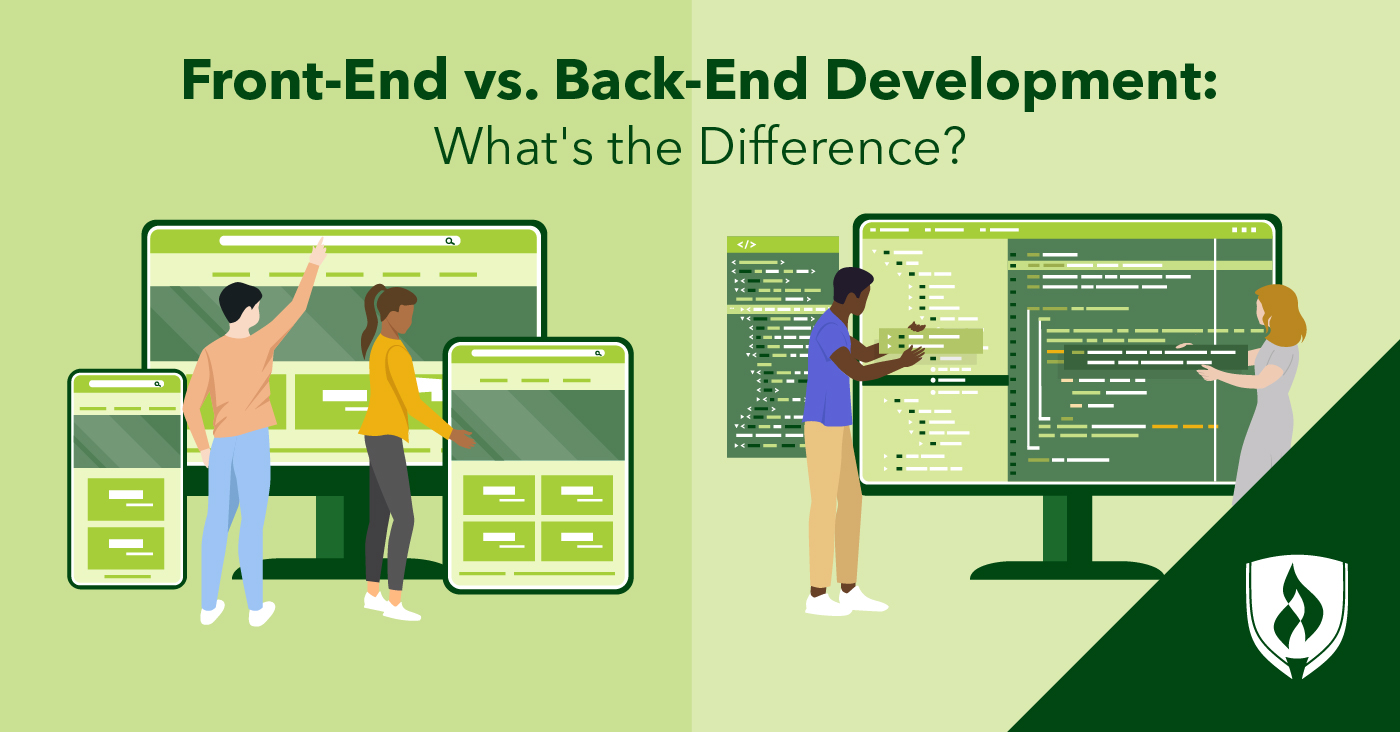
Imagine you’re building a brand-new house.
Would you trust the interior designer to handle the plumbing work? Would you ask the electrician to choose your paint colors? Probably not—most people realize that different areas of expertise need to be handled by their corresponding experts. That’s often the case with web development. Front-end web development and back-end web development sound so similar, many assume that they’re interchangeable.
But websites, like houses, have grown more and more complex over time. The result of this complexity is more skill-specialization and roles specific to different aspects of web development. Knowing that web development and digital design jobs are growing—the Bureau of Labor Statistics (BLS) projects a 13 percent growth in employment by 2030—you want to get a clearer picture of what makes these web development focus areas different.1
To figure out which “side” of website development is best for you, we laid out some of the most common questions in front-end versus back-end development and asked web developers to weigh in on what it takes to succeed in each area.
What is the difference between front-end and back-end development?
To put it simply, a front-end developer deals primarily with the outside appearance of a website—its virtual curb appeal. The back-end developer, on the other hand, is more concerned with the structure and the ‘guts’ of it—the stuff that makes sure it works as intended.
The work of front-end developers often focuses on designing and implementing layouts that make finding information (or whatever else the clients’ goal for users is) as intuitive and visually appealing as possible. They need to merge practicality with creative vision. Back-end developers’ work is focused on making sure the systems running behind the scenes—like databases—interface properly with what front-end developers are delivering to users. For example, ensuring customer billing information submitted via an on-page form is being accurately captured and relayed.
It should be noted that the dividing line between these web development disciplines is not particularly stark, and many who focus their work on back-end or front-end have some overlapping skills and knowledge of each.
Who earns more, front-end or back-end developers?
If you’re weighing where to focus your web development expertise, earning potential is obviously a factor worth considering.
You may find anecdotal evidence of one or the other earning more, but keep in mind there are a lot of variables in play. How hard is it to find your skill set? Have you mastered a valuable niche skill? Do you have a strong track record of work? Do you know enough about both “sides” of web development to help make projects run smoothly? Overall--the salary for each of these roles will depend more on experience level, location and employer than it depends on a job title.
Which is easier, front-end or back-end development?
This of course is a subjective question, but that doesn’t mean that we can’t help point you towards a development end that will be easier for you based on your own skill set. You’ll find this answer for yourself as you read on and gain a better understanding of what each potential position has to offer. Let’s consider the traits and personalities that are ideal in each position.
Skill set of a front-end developer
Front-end developers deal with a website’s user-facing code, which encompasses the visual appeal and overall layout of the site. But their attention isn’t just constrained to making a site look good. A website also has to function in a way that is satisfying and simple for the user to navigate.
Front-end developers should be great communicators who can collaborate with other stakeholders within the company. They should also be able to think big-picture and envision the end product. This holistic view differs from that of a back-end developer, who is often zeroed in on different pieces of the site.
“Empathy is also important, as front-end developers need to put themselves in end-users' shoes and be mindful of all details of the product experience,” says Weiting Liu, CEO of Codementor.
Skill set of a back-end developer
If front-end developers are focused on the features that make a website look good and easy to navigate, back-end developers are focused on building and maintaining the infrastructure that allows those features to exist in the first place.
The most sought-after skills for back-end developers involve programming languages and working with databases. Technical skills in Java®, PHP, JavaScript® and Python® topped the lists from online job postings this last year.2
Above and beyond the technical skills, successful professionals in this position are analytical and meticulous. They thrive when presented with the challenge of mapping out the logic needed to make a website both fully functional and able to address a business’ needs.
It’s important for back-end developers to have the ability to quickly decipher what’s being asked of them, according to Mark Tuchscherer, CEO of Geeks Chicago. Self-directed and self-motivated are both ideal characteristics for candidates in this position.
“Everyone wants a guru who can write amazing code, but we look for people who can take user stories and just run with them,” he says. “Having a back-end developer who needs to ask 50 questions about the work each day can be a major liability.”
This is why back-end developers need a strong knowledge of programming and the logic that makes it work.
Is it possible to specialize in both front- and back-end development?
Yes, it is. Employers commonly seek out “full stack developers.” And it’s easy to see why—these professionals can cover both front- and back-end development projects. This demanding dual-threat approach can be a great fit for the aspiring developers who find themselves torn between front-end and back-end work—or want to help improve their marketability.
These developers are an understandably desirable choice for businesses and organizations with limited resources, as they can provide a great value for the cost.
But does that mean everyone should aspire to be a full-stack developer? Not necessarily. The realities of web development and its increasing complexity make this incredibly difficult to accomplish, especially for inexperienced developers. Larger organizations with complex challenges will likely continue seeking highly specialized professionals for precise projects.
“It is becoming more common for web developers to specialize in either front-end or back-end,” Liu says. “10 years from now, as web technologies become more complex and advanced, it [will] become gradually harder for a single developer to know everything.”
Is web development in your future?
Now that you understand the distinction between front-end versus back-end developers, you should have an idea of where your skills can be best put to use. And as you know, there’s a lot to learn in this fast-changing field.
Want to learn more about where programming and coding skills could take you? Check out our article "9 Programming Careers for Coding Connoisseurs."
1Bureau of Labor Statistics, U.S. Department of Labor, Occupational Outlook Handbook, [accessed December 2021] www.bls.gov/ooh/. Information represents national, averaged data for the occupations listed and includes workers at all levels of education and experience. This data does not represent starting salaries. Employment conditions in your area may vary.
2Burning-Glass.com (analysis of 3,607 back-end developer job postings, Nov. 01, 2020 - Oct. 31, 2021.)
Java and JavaScript are registered trademarks of Oracle Corporation.
Python is a registered trademark of The Python Software Foundation.
EDITOR’S NOTE: This article was originally published in 2016. It has since been updated to include information relevant to 2022.




